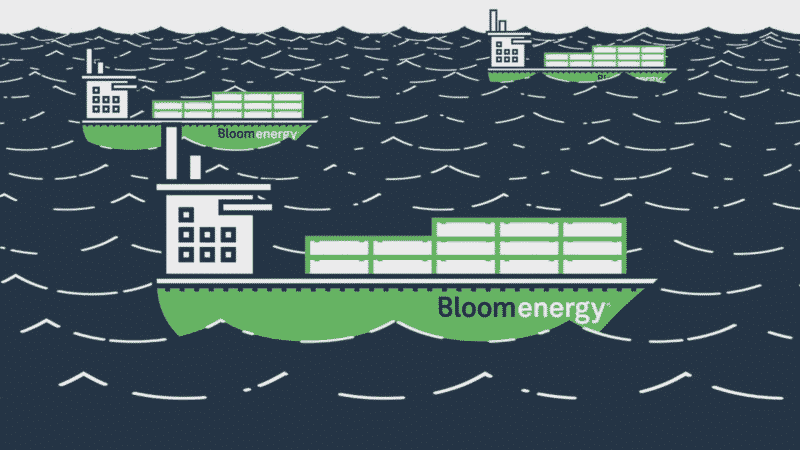
[ad_1]

Bloom Energy announced the achievement of two key milestones on its path to decarbonize a centuries-old maritime industry. In conjunction with Samsung Heavy Industries (SHI), the companies’ initial design for an engineless, fuel cell-powered liquefied natural gas (LNG) carrier has received Approval in Principle (AiP) from DNV, a premier international maritime classification society.
Bloom Energy also received verification as an alternative power source for vessels as part of the American Bureau of Shipping’s (ABS) New Technology Qualification (NTQ) service. This progress is a testament to Bloom Energy’s industry leadership in providing clean, reliable power through its flexible platform technology that can seamlessly adapt to future-forward applications.
The opportunity for fuel cell-powered ships has accelerated in recent years, as the International Maritime Organization (IMO) set aggressive environmental targets to combat climate change. A key objective for international shipping under the IMO’s mandate is to reduce greenhouse gas emissions by half compared to 2008 levels.

Image Credits: Bloom Energy
New technologies and power sources for shipping, like fuel cells, are recognized as viable carbon-reducing solutions to achieving the IMO’s environmental goals.
DNV Approval in Principle Granted for 100 Percent Fuel Cell-Powered LNG Carrier
SHI and Bloom Energy first announced plans in 2019 to design and develop fuel cell-powered ships. Earlier this month, the companies took another step toward realizing that goal with receipt of an Approval in Principle from DNV, an international maritime classification society, for an LNG carrier powered solely by solid oxide fuel cell (SOFC) technology. This fuel cell-propelled LNG carrier eliminates the need for internal combustion engines by replacing the ship’s propulsion and auxiliary engines with fuel cells running on non-combusted natural gas.
“With 80 percent of world trade taking place by sea, Bloom Energy and SHI have developed a novel solution to reduce harmful emissions and modernize one of the world’s oldest forms of trade with cutting edge, clean energy technology,” said Suminder Singh, senior director, engineering, marine applications, Bloom Energy. “Building on the successful deployment of our fuel cells on land powering large loads, Bloom Energy Servers are well-suited to meeting the significant energy requirements of shipping vessels. They are also highly efficient, reduce fuel usage, and in the case of LNG carriers, create enhanced opportunities for operators to sell fuel at port.”
Bloom Energy’s SOFC technology has the added benefit of eliminating harmful air pollutants like sulfur oxides (SOx), nitrogen oxides (NOx), and particulate matter, has negligible methane slippage, and can significantly reduce carbon dioxide emissions from shipping vessels. As such, the new fuel cell-powered LNG carrier is expected to provide operators a more sustainable option to meet international emission reduction targets.
“Our new concept vessel can dramatically reduce air pollutant emissions, as well as noise and vibration and maintenance and repair costs, by replacing an internal combustion engine with fuel cells,” said Jeong Ho-hyeon, head of Samsung Heavy Industries’ Technology Development Division. “We will lead the international standardization of fuel cell propulsion systems.”
SHI plans to conduct tests at LNG demonstration facilities at its shipyard in Geoje, South Korea and will be launching full-scale marketing for global ship developers.
ABS Verifies Bloom Energy’s Fuel Cell Technology for Marine Environment
Bloom Energy’s technology was recently awarded a Concept Verified Statement of Maturity by ABS, a leading global provider of classification and technical advisory services to the marine and offshore industries.
ABS engineers reviewed Bloom Energy’s SOFC technology and verified its potential application as an alternative power source for vessels as part of the ABS New Technology Qualification (NTQ) service. The NTQ service offers guidance on early adoption and efficient implementation of new technologies – demonstrating the technologies’ maturity and risk profile.
“The certification process for marine fuel cells is a rigorous process, requiring new technologies undergo a variety of operating scenarios to ensure they can withstand the harsh conditions at sea,” said Suminder Singh. “This verification demonstrates the durability of Bloom Energy’s technology and serves as an important milestone on our path to commercial application.”
“ABS understands the potential that Bloom Energy has to make a real contribution to shipping’s decarbonization ambitions,” said Patrick Ryan, senior vice president, global engineering and technology, ABS. “Our verification highlights the progress of Bloom Energy’s technology to be used at sea, and it marks our commitment to supporting the industry with the safe adoption of fuel cells that meet the highest of standards.”
Bloom Energy expects to achieve final ABS certification and classification in 2022.
Reference: bloomenergy.com
Marine Insight does not own the rights of the video.
Bloom Energy’s Solid Oxide Fuel Cells To Power An Engineless LNGC Developed By SHI appeared first on Marine Insight – The Maritime Industry Guide
[ad_2]
This article has been posted as is from Source